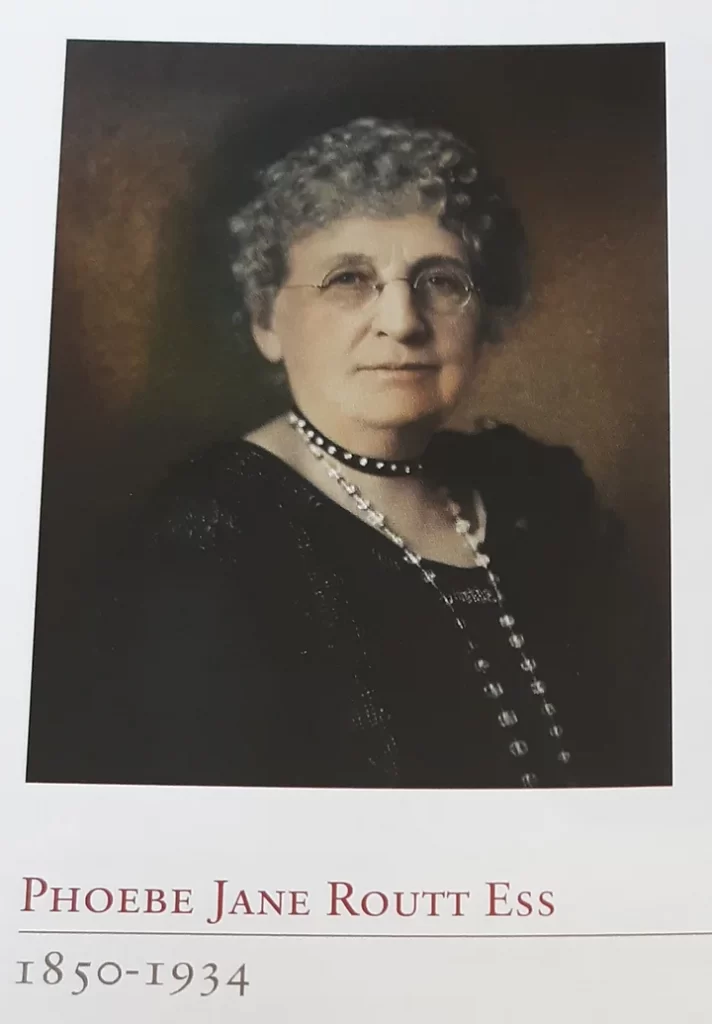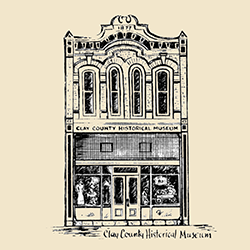 Known as “The Dean of Missouri Club Women,” Phoebe Ess was an enthusiastic and energetic women’s advocate throughout her life. She lived in an era where women either worked low paying jobs or considered their families to be their job. Mrs. Ess managed to work tirelessly for various reforms while raising a family and creating a home. At the time, she might have been viewed as a “modern” woman. She led her interesting life to the fullest while investing in the community.
Known as “The Dean of Missouri Club Women,” Phoebe Ess was an enthusiastic and energetic women’s advocate throughout her life. She lived in an era where women either worked low paying jobs or considered their families to be their job. Mrs. Ess managed to work tirelessly for various reforms while raising a family and creating a home. At the time, she might have been viewed as a “modern” woman. She led her interesting life to the fullest while investing in the community.
Phoebe Jane Routt was born in Versailles, Kentucky, in 1850 to Thomas and Olivia Routt. She was one of four children. Her grandfather, Rodham Routt was a large landowner, farmer, cabinet maker and appraiser. Her great grandfather was born in Wales and fought in the Revolutionary War.
In 1854, the Thomas Routt family of 6 moved from Versailles, Kentucky to Liberty, Missouri, where his brother, Henry L. Routt was an established lawyer. Thomas was a prosperous farmer, sending his three daughters to the Clay Seminary. Phoebe graduated in 1865. A quote from Mrs. Ess later in life about the school stated, “The course of Study was high for that age and called for brain work such as the youngsters of today know nothing about, with their modern methods and assistants in their studies.” The Clay Seminary founder, Professor James Love believed in a woman’s ability to think and to act. Phoebe did both, for a lifetime.
Moving again in 1872, Thomas Routt began farming in Jackson County. Kansas City would be home for Phoebe for her remaining 62 years. She taught at the Washington School, the city’s first public school, until she married, Henry Newton Ess, a Kansas City lawyer in 1875. The following years were consumed with three children, various live-in relatives and her ceaseless efforts to advocate for women’s and children’s rights.
Phoebe was the founding member of many women’s organizations including the Tuesday Morning Study Club in 1882 and Federal Federation of Women’s Clubs (M.F.W.C.) co-founder in 1889. Other organizations she belonged to, and many she helped organize, included Women of the Humane Society; Council of Clubs; Susan B. Anthony Civic Club (she was founder and president for 23 years;) League of Women Voters; Jefferson Democratic Club; Woman’s City Club, Mother’s Day Nursery; the Mothers and Children Society (forerunner of PTA) and the Welfare League for the Prevention of Crime and Delinquency.
She was also an early president and charter member of the Athenaeum Club, a women’s organization founded in 1894 and affiliated with the General Federation of Women’s Clubs, Inc. The group purchased land and built the Athenaeum Club House at Linwood Boulevard and Campbell Street in Kansas City, Missouri. Members raised money for the building by selling canned goods, and needlework. They also produced musical productions to raise funds. The Club House, a center for advocacy and empowerment, was opened in 1914 with more than 500 members. The building was sold in 2015 to Delta Sigma Theta Sorority and is now known as the Delta Athenaeum. One of 13 women who made notable contributions to the city, Phoebe’s name is inscribed on the second fountain created in Kansas City which was completed in 1899 at 9th and Paseo. It is the oldest surviving fountain in Kansas City and designated “The Women’s Leadership Fountain.”
The early 1900s were especially busy times for suffragettes. In 1907, Phoebe as Secretary of the Missouri Federation of Women’s Clubs, gave an address on child labor in Missouri that was printed in newspapers as far away as Chicago. In 1915 she was elected the vice president of the State Women’s Organization and was a delegate in 1916 to the state suffrage meeting in St. Louis. Two years later she became the first woman to run for public office, allowing her name to be placed on the ballot for the Kansas City School Board. She lost.
Phoebe spoke at the 1919 Missouri Day Celebration on suffrage. “The year of 1920 will be a women’s year in the United States of Missouri,” she said. “Why? Because we have ratified the Susan B. Anthony amendment. Missouri has been black in the sweep of suffrage until a few weeks ago, when it ratified the measure.” “…Mrs. Henry N. Ess is known to every Missouri club woman and is a member of the State Board of M.F.W.C.” (Chillicothe Constitution-Tribune MO September 5, 1919). August 18, 1920, when the 19th Amendment was ratified, Phoebe’s goal was met.
After accomplishing her goal in women’s suffrage, Phoebe continued to be a prominent voice for women and children. In a 1932 Athenaeum Club dinner she was honored for her work not only in suffrage, but education and child welfare, prison reform, libraries, prohibition and world peace.
Phoebe Jane Routt Ess died in 1934 at the age of 84. An obituary stated she was “the dean of Missouri club women.” Family was of great importance to Phoebe as well as her civic involvements. She made a home for not only her husband and three children, but her elderly aunt, Sophronia Routt, her twin sister and her sister’s husband, a dry goods salesman.
A quote from Phoebe in a University of Kansas paper by Kelsey Carls demonstrates how she felt about her life. “I came of a liberal-minded people – I was born with the principles of equal opportunity for all ingrained in my soul.”
Chery Carr Holtman, curator, Clay County Museum
